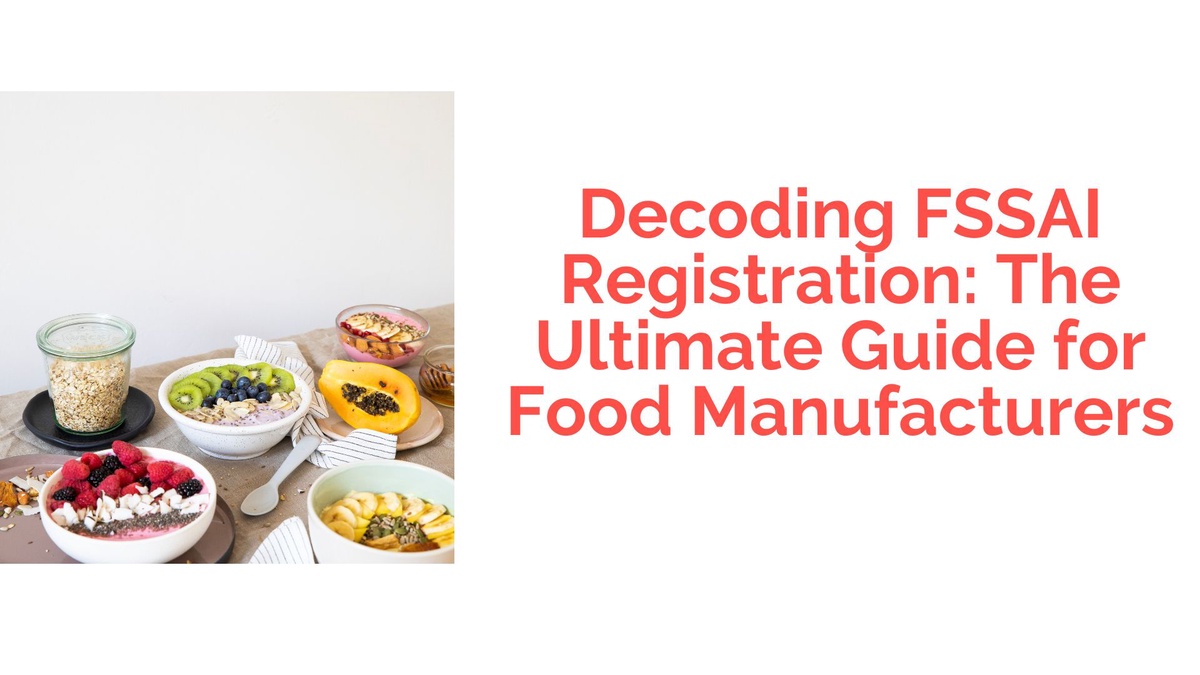Introduction:
In the dynamic landscape of food manufacturing, adherence to safety and regulatory standards is paramount. Among the various regulatory bodies, the Food Safety and Standards Authority of India (FSSAI) plays a pivotal role in ensuring the quality and safety of food products circulating in the Indian market. For food manufacturers, obtaining an FSSAI registration certificate is not just a legal requirement but a mark of credibility and trustworthiness. In this comprehensive guide, we delve into the intricacies of FSSAI registration, providing a roadmap for food manufacturers to navigate through the process seamlessly.
Understanding FSSAI:
The Food Safety and Standards Authority of India (FSSAI) is an autonomous body established under the Ministry of Health & Family Welfare, Government of India. Its primary objective is to regulate and oversee the safety and standards of food products to ensure consumer protection and promote public health. FSSAI formulates regulations, sets standards for food products, and lays down guidelines for their manufacture, storage, distribution, sale, and import.
Importance of FSSAI Registration:
FSSAI registration is mandatory for all food businesses operating in India, including manufacturers, processors, packers, distributors, and retailers. It serves as a mechanism to ensure that food products meet specified quality standards and are safe for consumption. Additionally, FSSAI registration instills consumer confidence, enhances marketability, and facilitates trade both domestically and internationally.
Types of FSSAI Registration:
Basic Registration:
Applicable to small-scale food businesses with an annual turnover not exceeding Rs. 12 lakhs. This registration is ideal for startups, small-scale manufacturers, and businesses operating at the local level.
State FSSAI License:
Suitable for medium-sized enterprises operating within a single state and having an annual turnover between Rs. 12 lakhs and Rs. 20 crores. It is mandatory for manufacturers, distributors, and suppliers operating at the state level.
Central FSSAI License:
Compulsory for large-scale manufacturers with a turnover exceeding Rs. 20 crores annually or those involved in import-export activities. This license is applicable for businesses operating across multiple states or engaging in interstate trade.
Process of Obtaining FSSAI Registration:
Application Submission:
Food manufacturers need to submit the prescribed FSSAI registration or license application form along with requisite documents to the respective State or Central FSSAI authority, depending on the scale of operation.
Document Verification:
Upon receiving the application, FSSAI authorities verify the submitted documents, including identity proof, address proof, details of food products, manufacturing process, and infrastructure.
Inspection:
In some cases, FSSAI officials may conduct an inspection of the manufacturing premises to assess compliance with hygiene and safety standards as per the Food Safety and Standards Act.
Certificate Issuance:
Upon successful verification and inspection, the FSSAI registration certificate or license is issued to the food manufacturer, indicating the validity period and registration/license number.
Compliance Requirements for FSSAI Registered Manufacturers:
Once registered, food manufacturers are obligated to comply with various regulations prescribed by FSSAI, including:
- Maintaining hygiene and sanitary conditions in the manufacturing premises.
- Ensuring proper labeling, packaging, and storage of food products.
- Following Good Manufacturing Practices (GMP) and Hazard Analysis and Critical Control Points (HACCP) principles.
- Regularly testing food products for safety and quality parameters.
- Displaying the FSSAI license/registration number on product labels and promotional materials.
Renewal of FSSAI Registration:
FSSAI registration certificates and licenses are valid for a specified duration, typically ranging from 1 to 5 years, depending on the type of registration. Food manufacturers are required to renew their registration/license before the expiry date to maintain compliance with FSSAI regulations.
Note: You Can Apply for Fssai license certificate renewal Through FSSAI Portal
Conclusion:
Obtaining an FSSAI registration certificate is not just a legal formality but a crucial step towards ensuring the safety and quality of food products manufactured in India. By adhering to FSSAI regulations, food manufacturers demonstrate their commitment to consumer health and well-being while fostering trust and credibility in the marketplace. Through this comprehensive guide, food manufacturers can navigate the intricacies of FSSAI registration with clarity and confidence, paving the way for sustainable growth and success in the dynamic food industry landscape.


No comments yet